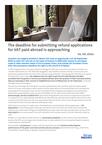
The deadline for submitting refund applications for VAT paid abroad is approaching
It often happens that a company subject to Hungarian VAT uses a service or purchases a product in a member state where it is not otherwise engaged in any taxable economic activity. In such a case, the purchase is subjected to local VAT, which cannot be accounted for in the Hungarian VAT return. It is good to know that in such cases, tax subjects have the right to get the VAT paid abroad refunded, provided that the goods or services purchased abroad serve the purpose of their business activity they are pursuing in their country of establishment and entitling them to VAT deduction, moreover through a special procedure.
The process of foreign VAT refunds for countries established in the member states of the European Union is in a one-stop system, which means that the application is to be submitted to the tax authority according to the company’s own country of establishment. Hungarian tax subjects may submit their applications, separately for each country, to the National Tax and Customs Administration (NAV) electronically, via the ELEKAFA form specifically designated for this purpose. Applications submitted in a paper form are automatically rejected by the tax authority, without examining the merits of the case. In case of the third countries, the one-stop system does not work; in their case, the applications are to be submitted directly to the tax authority of the given state.
With respect to invoices in a given year, the deadline for submitting the refund application is 30 September of the following year (this year, the VAT content of invoices for 2023 can be reclaimed). However, be careful when filling out the ELEKAFA form due to the fact that only the latest version of the 24ELEKAFA form can be used for the VAT refund for 2023, furthermore for the VAT refund for 2024 as well.
Further, it is important to note that this is a peremptory deadline; in other words, once the deadline expires, the VAT can no longer be reclaimed, even in case a petition for an exemption based on special circumstances is submitted.
The mandatory enclosures to submit with the application are the invoices evidencing the performance of the given economic activity and any annexes attached therewith (e.g., order form, certification of performance, waybills, customs documents).
The receipt of the application is confirmed by the tax authority without delay, which then forwards the relevant parts of the application to the state on the basis of the place of the VAT refund, the tax authority of which will then evaluate the application.
The foreign tax authorities have 4 months for the evaluation of the applications. It may also happen that the competent tax authority calls upon the tax subject to submit additional documentation or to make a declaration, in which case the deadline for the evaluation of the application may be extended ex officio, but in no case can it exceed 8 months. The tax subject has 1 month to comply with such calls. In each case, the tax authorities inform applicants on the approval or rejection of their application in writing. The tax authority with competence on the place of the refund will then make arrangements for transferring back the approved amount of the VAT refund within 10 business days.
It is important to note that in each case, the rules of the given country of source are applicable for the refunding of foreign VAT. Even though the rules of VAT are fundamentally harmonised on the EU level, there may still be some differences in the details (e.g., the deductibility of the VAT content of invoices for fuels); therefore, it is important to ask for assistance by an advisor that is familiar with the possible pitfalls and local specificities.
For many tax subjects, it also poses difficulties in the VAT refunding process that the foreign tax authority conducts its procedure and the related correspondence in a language other than the chosen language of the applicant. In such a case, if the tax subject misses the deadline – even due to the time required for preparing the necessary translations – the tax authority will reject the application, without the possibility to repeat the procedure.
Finally, we note, that in addition to EU member states, it is also possible to get VAT refunded in connection with transactions in third countries, on the basis of the principle of reciprocity (such third countries include Switzerland, Liechtenstein, Norway, the Republic of Serbia, Turkey under certain conditions and the United Kingdom – having regard to the Protocol on Ireland/Northern Ireland of the Agreement on the withdrawal of the United Kingdom of Great Britain and Northern Ireland from the European Union and the European Atomic Energy Community).
Document
Want to know more?


